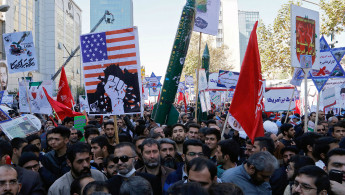US extends 'national emergency' governing Iran relations
Despite rapprochement following a landmark nuclear deal earlier this year and the ending of some sanctions on Iran, Washington continues to view Tehran as an 'extraordinary threat to national security'.
2 min read
Demonstrations took place in Tehran to commemorate anniversary of the storming of the US Embassy[Getty]
The United States announced the extension of a national emergency act with regards to dealings with Iran.
The International Emergency Economic Powers Act has been in place since November 1979 and was originally enacted in the aftermath of the Iran hostage crisis, when 52 American diplomats and citizens were held hostage for a total of 444 days after a group of Iranian students stormed the US Embassy in Tehran.
Its extension illustrates that despite a landmark deal over Iran’s nuclear programme, that lead to sanctions against Tehran being dropped earlier this year, Washington continues to view the country as an “extraordinary threat to the national security, foreign policy, and economy of the United States”.
Thursday's announcement came on the same day that demonstrations took place in Tehran to commemorate the 37 year anniversary of the storming of the US Embassy in the city. It also comes in the midst of a diplomatic row between Washington and a number of EU states concerning Mahan Air, an Iranian carrier that US officials claim has a close relationship with Iran’s controversial Revolutionary Guards Corps and has been used to transport troops and munitions to Syria in support of the regime of Syrian President Bashar al-Assad.
According to various media reports, Mahan Air has gained the rights to operate commercial flights in more than 12 European and Asian countries despite featuring on a US terror-related sanctions list.
The US lacks jurisdiction to change EU laws related to Mahan Air. Instead, Washington is currently limited to pursuing companies that work with the Iranian airline such as banks, baggage handling companies, and cargo and freight companies. Attempts are also being made to persuade EU states, such as Germany – where Mahan Air operates out of two cities – to follow suit with US protocol.
While the agreement Iran signed with the US and four other world powers late last year ended sanctions imposed on Tehran for its nuclear programme, the US has notably maintained sanctions related to ballistic missile research, terrorism, human rights abuses, and money laundering.
The International Emergency Economic Powers Act is a US federal law authorising the President to regulate commerce after declaring a national emergency in response to perceived unusual or extraordinary threats to the US originating outside its borders.
A statement released by the White House on Thursday stated that the emergency act would continue because US “relations with Iran have not yet returned to normal”.
The International Emergency Economic Powers Act has been in place since November 1979 and was originally enacted in the aftermath of the Iran hostage crisis, when 52 American diplomats and citizens were held hostage for a total of 444 days after a group of Iranian students stormed the US Embassy in Tehran.
Its extension illustrates that despite a landmark deal over Iran’s nuclear programme, that lead to sanctions against Tehran being dropped earlier this year, Washington continues to view the country as an “extraordinary threat to the national security, foreign policy, and economy of the United States”.
Thursday's announcement came on the same day that demonstrations took place in Tehran to commemorate the 37 year anniversary of the storming of the US Embassy in the city. It also comes in the midst of a diplomatic row between Washington and a number of EU states concerning Mahan Air, an Iranian carrier that US officials claim has a close relationship with Iran’s controversial Revolutionary Guards Corps and has been used to transport troops and munitions to Syria in support of the regime of Syrian President Bashar al-Assad.
According to various media reports, Mahan Air has gained the rights to operate commercial flights in more than 12 European and Asian countries despite featuring on a US terror-related sanctions list.
The US lacks jurisdiction to change EU laws related to Mahan Air. Instead, Washington is currently limited to pursuing companies that work with the Iranian airline such as banks, baggage handling companies, and cargo and freight companies. Attempts are also being made to persuade EU states, such as Germany – where Mahan Air operates out of two cities – to follow suit with US protocol.
While the agreement Iran signed with the US and four other world powers late last year ended sanctions imposed on Tehran for its nuclear programme, the US has notably maintained sanctions related to ballistic missile research, terrorism, human rights abuses, and money laundering.
The International Emergency Economic Powers Act is a US federal law authorising the President to regulate commerce after declaring a national emergency in response to perceived unusual or extraordinary threats to the US originating outside its borders.
A statement released by the White House on Thursday stated that the emergency act would continue because US “relations with Iran have not yet returned to normal”.





 Follow the Middle East's top stories in English at The New Arab on Google News
Follow the Middle East's top stories in English at The New Arab on Google News


